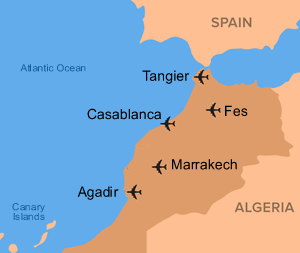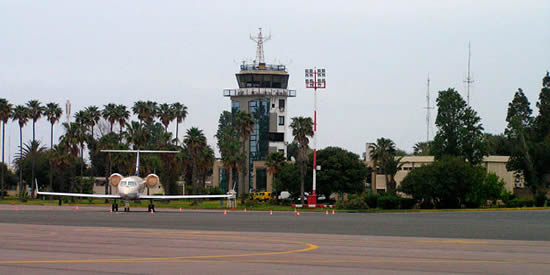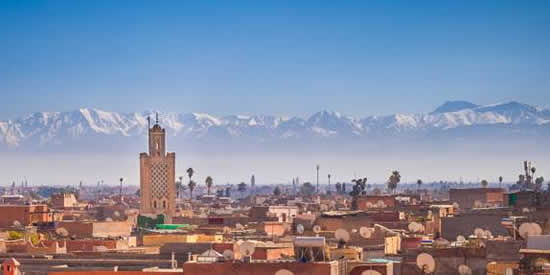| BlueSky Business Aviation News | ||||||||||||||
|
||||||||||||||
It is a beautiful country with rich cultural traditions and history, a good year-round climate and very welcoming, multi-lingual, educated people.
This article will cover the main logistical and regulatory aspects required for the smooth operations of private and business aviation flights to Morocco. Main Airports Rabat is the capital of Morocco; however, its airport Rabat Sale (ICAO: GMMF / IATA: RBA) is not the biggest in the country. Casablanca Mohammed V Airport (GMMN / CMN) is the main commercial airport of the country, and it is the hub of Royal Air Maroc, the national airline of the country. Marrakech Menara Airport (GMMX – RAK) is another very important airport in Morocco. Other important airports in Morocco include: Agadir (GMAD / AGA), Fes (GMMF / FEZ), Nador (GMMW / NDR), Oujda (GMFO / OUD), and Tangier (GMMT / TNG). All of the above are airports of entry, and are open 24 hours. Landing Permit Morocco is a member of the International Civil Aviation Organization (ICAO). Accordingly, the Moroccan aviation regulations as stipulated in the Moroccan Aeronautical Information Publication (AIP) clearly state that private flights operated by aircraft registered in an ICAO member state and overflying the territory of Morocco or landing in the airports of Morocco, do not require a previous authorization. However, a flight plan shall be submitted at least 24 hours prior to the departure of the aircraft from its base to the Civil Aviation Authority of Morocco, and to the airport the aircraft is expected to land in. The only exceptions are GMML and GMMH, where prior permit is mandatory. If the aircraft is registered in a country that is not a member of ICAO, or if the flight is a charter flight, then a request for authorization (landing permit) including the following information must be submitted to the Moroccan civil aviation authority:
Aircraft main documents must be submitted along with the application as well for commercial passenger charter and cargo flights. Securing the landing permit requires the application to be submitted by a local supervisory agent. A special form must be filled in and signed for the permit to be issued.
Ground Handling Royal Air Maroc has been the main commercial ground handling service provider in Morocco for many years. Swissport entered the ground handling market in Morocco a few years ago. Over the years, there were no business aviation terminals available in the Moroccan airports, and business aviation travelers are processed in the same facilities of the commercial terminals all passengers travel through. Swissport has established an Executive Aviation department that is dedicated to serving business, private, and charter flights with a team that is trained and equipped to handle the special needs and requirements of such travelers. Furthermore, the Ministry of Transport of Morocco and the Civil Aviation Authority have licensed specialized supervision representative companies to facilitate the trips of business aviation flights to Morocco, besides securing landing and overflight permits. However, recently, and after a comprehensive and rigorous open tender process, ONDA (The Moroccan National Airports Authority) has awarded Swissport International and Jetex Flight Support contracts to build and operate FBOs in its airports. Whilst Jetex will be the FBO provider in Casablanca Mohammed V, Marrakech Menara, Rabat-Salé, Agadir-Al Massira, and Dakhla airports, Swissport will be the FBO provider in Casablanca, Marrakech, Rabat, and Tanger. Aviation Fuel Shell, VIVO Energy, and Oil Libya are the main aviation fuel into-plane suppliers in Morocco. While VAT is not imposed on refueling for international flights, VAT is levied on flights operating domestically between Moroccan airports, and this is common due to Morocco’s large territory. Visas and Immigration While crew can enter Morocco with visas secured upon arrival if they’re in uniform, holding crew ID and on general declaration, sometimes the clearing process gets delayed until the approval is secured by higher authorities, especially at night. Passengers from more than 70 countries can enter Morocco for visit with a visa valid for up to 90 days obtained upon arrival. These include EU countries, USA, Russia, and many others, including GCC countries. Additionally, for all type of flights, the immigration authority obliges passengers and crews to fill in landing cards, with no exception for business aviation flights. VIP passengers are also required to fill in the forms personally. If the crew would like to access the aircraft after leaving it, then a lengthy process of approval and security measures must be followed, as a written request should be addressed to the relevant authority must submitted 24 hours before access to the aircraft.
Concierge Services Rabat, Casablanca, and Marrakech all have multiple international hotel chains with properties in Morocco. The city of Marrakech is noted for its luxurious hotels, which provide high quality and unsurpassed customer services. More than 30,000 beds are offered by the city. While there have been no security problems reported recently in the country, the level of public transportation and taxis might not be appropriate for business travelers and crew, so pre-booked chauffeured transportation would be required. As for inflight catering, the levels of catering provided meet the international standard in quality and presentation. Many international companies provide inflight catering in the Moroccan airports. Servair, the third largest catering provider in the world, inaugurated its site in Morocco in partnership with Atlas Catering, a subsidiary of the national airline Royal Air Maroc, in Casablanca, Marrakech and Agadir. Newrest Group has also acquired 100% of ATASA Company, the Moroccan subsidiary of the Spanish Areas Group. Moroccan GDP is showing a continued growth, resistant to the global crisis and the Arab Spring uprisings. The Moroccan government has also launched big projects concerning all economic aspects. The stability of the political regime and the qualifications and tolerant mentality of the Moroccans make Morocco attractive for foreign investment, which will lead to increasing business aviation operations. Dr. Adnan Branbo is the Chief Executive Officer of iJET, a flight support service provider based in Malta and Dubai. iJET services include over-flight and landing permits, credit ground support arrangements, and highly competitive aviation fuel. iJET network covers the world, through alliances and relationships with local agents and major suppliers around the world. Adnan can be reached at: adnan@ijet.aero In this series: Algeria | Angola | Jordan | Kuwait | Malta | Mauritius | Morocco| Nigeria | Oman | Qatar | South Korea | Sri Lanka | UAE
|
||||||||||||||




